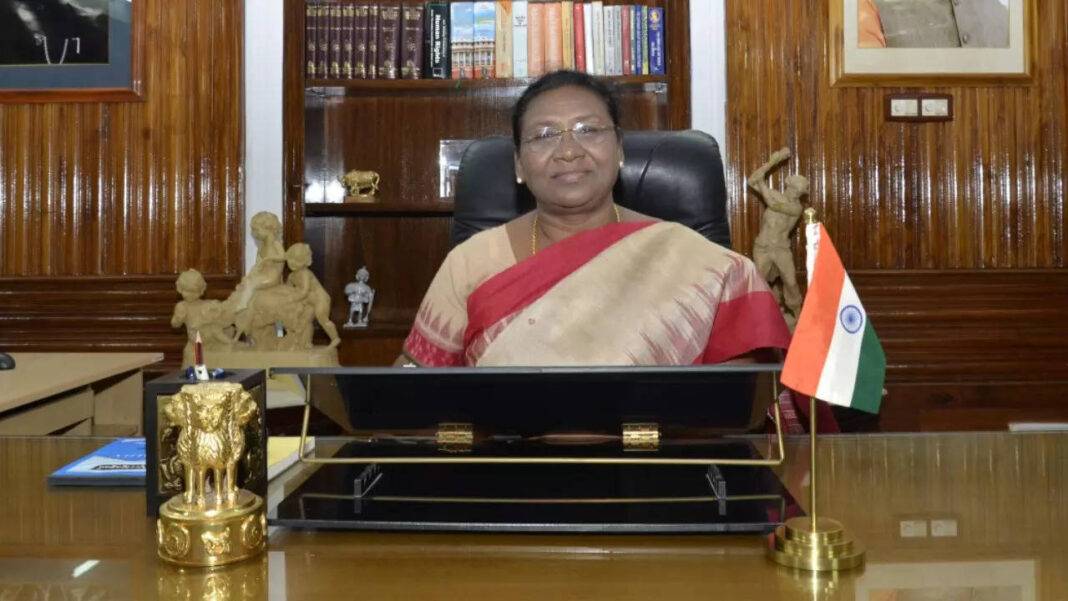On the morning of 25th July 2022, Droupadi Murmu, the first citizen of this country, moments after assuming her office as the 15th President of the Indian Republic, greeted the legislature and the people of this country with “Johar“, which made us realize that it indeed is a momentous occasion in the democratic history of this country. She became the first Adivasi and second women President of India. It took us seventy-five years to find a suitable Adivasi to assume the highest post in the country.
Beyond Tokenism: The importance of Representation
The fascinating journey of a Santhal woman belonging to one of the most backward regions of this country braving all odds to become the Indian President is a story apt for history books. Murmu’s ascendency makes us reflect on another journey that our nation had undertaken since 24th January 1947, when Olympic-winning hockey player and great Adivasi leader Jaipal Singh Munda in his speech in the Constituent Assembly, bemoaned the lack of adequate tribal representation in the constituent assembly where the future of the Indian republic was being written. He was particularly concerned about the absence of any tribal woman in the assembly. Today, Droupadi Murmu, an Adivasi woman occupying the highest post of the Indian Republic, should make us reflect on the long and tiring journey of 75 years that made it possible to have an Adivasi president.
Much has been spoken and written about the BJP’s intentions in electing an Adivasi woman President and the continuation of the processes of symbolic outreach and tokenism towards the marginalized communities by the BJP-RSS combine. However, such debates have steered away from the following two critical points. Firstly, the post of Indian President is constitutional and highly symbolic. The recent history of Presidential elections in India shows that the polls have always been fought on symbolic ground. Also, in a multi-ethnic democracy, symbolic representation goes beyond mere tokenism. It is inclusion by representation. BJP is way ahead of opposition parties, even in terms of token representation. Secondly, supporters of the tokenism argument fail to acknowledge the political journey of a poor tribal woman from Mayurbhanj in Orrisa to the Raisina Hills. Murmu has not just been airdropped on the presidential seat from nowhere. She started her political journey from the lowest levels by contesting and winning the councillor post from Rairangpur. She later became MLA from the Rairangpur seat and a minister in the state’s BJP-BJD coalition government. She also served as the governor of Jharkhand from 2015-2021. Her political journey would act as inspiration for people from marginalized sections of the society who rarely get represented in the country’s top positions.
Sangh Parivar and its Expanding Social Base
The continuous otherization of Muslims that has been the BJP’s central political plot primarily since 2014 often masks other aspects of the BJP’s political juggernaut. An important part of BJP’s contemporary political dominance is its change in stance towards marginalized groups in recent decades. The old description of the BJP being an urban upper caste party ignores the ground reality. The contemporary understanding of the Sangh Parivar should capture its concentrated efforts to expand its social base. When it comes to increasing its reach among the Adivasis, RSS has worked tirelessly through its affiliate Akhil Bhartiya Vanvasi Kalyan Ashram (ABVKA), founded in 1952 to counter the missionaries in central India. In recent times other affiliates of RSS, such as Seva Bharti, have complimented the work of ABVKA in Adivasi areas. The cultural politics of RSS at the grassroots and service provisioning in the remote Adivasi regions have played a crucial part in BJP’s electoral victories in the Adivasi areas.
It was no surprise when BJP decided to elect Droupadi Murmu, an Adivasi party worker who worked at the grassroots and moved up the ranks to stake a claim for the highest post in the country. Her election as the President compliments the BJP-RSS policy of outreach toward the marginalized sections of society. This episode also reveals that BJP is way ahead of other opposition parties in terms of the politics of representation. “It is because of BJP that we the first Adivasi President of India. Other political parties could have done it before. Still, they did not, so why should I worry about BJP giving much-required Representation to Adivasis” Adivasi activist and writer Vasavi Kiro argued assertively when I asked her about the BJP’s political vision of having an Adivasi President.
Droupadi Murmu and the Politics of Hope
BJP under Narendra Modi has been impeccable regarding understanding the socio-political aspirations of marginalized groups, thus creating a political mood that generates support for BJP, which is then translated into votes. The ascendency of an Adivasi woman to the highest post would also have a similar impact. As you talk to Adivasis and sift through social media, one would realize the popularity and importance of this political move by the BJP. It will strengthen BJP’s constituency among the marginalized groups, especially Adivasis and should benefit BJP in upcoming elections in Gujrat, Chhattisgarh and Madhya Pradesh.
Adivasis, who constitute 10.43 crore of the total population, are our country’s most marginalized social groups. A cursory glance at the developmental profile of the Adivasis would reveal that on all parameters of development, they lag behind other social groups. The nation’s developmental goals have led to continuous displacement and loss of livelihood for thousands of Adivasis since Independence. Adivasis have been shabbily treated by the Indian state since Independence. To have a female Adivasi as the President of our country today ignites hope for a better tomorrow, especially among the Adivasis. However, having an Adivasi at the top is not the cure for all the problems that Adivasis face today. While we have an Adivasi President, Adivasis continue to get displaced, deprived and disenfranchised in different parts of our country. It is now her political actions and assertions as the President of India that would determine whether the hope she embodies today is actualized or not.
Kunal Nath Shahdeo is pursuing his PhD in Sociology from IIT Bombay














